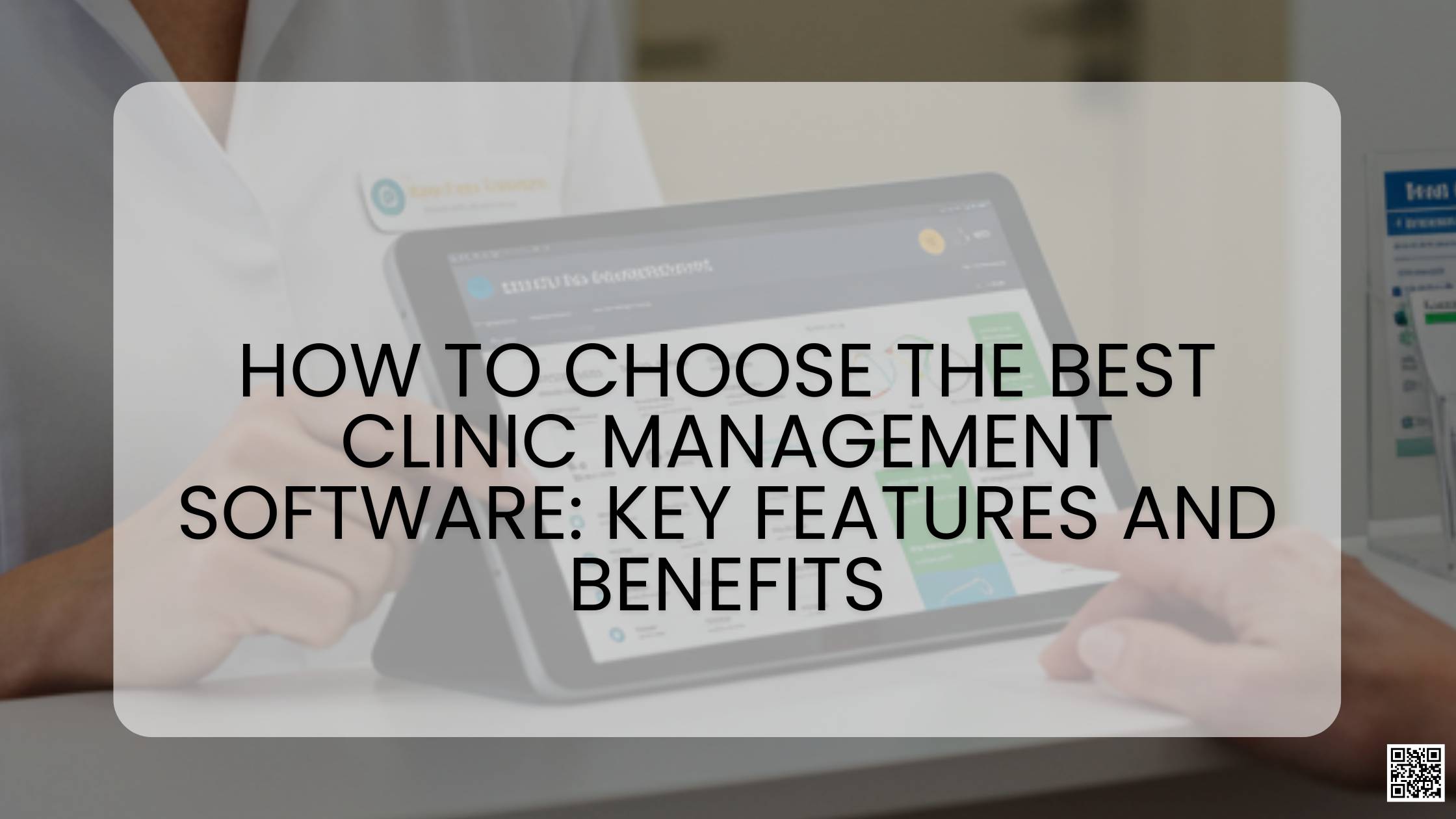Running a clinic efficiently requires more than just excellent care. Managing appointments, billing, patient records, and communication can quickly become overwhelming. That’s why choosing the right clinic management software is essential for any healthcare practice aiming to improve patient experience and streamline operations.

This guide breaks down what you need to look for when selecting software that fits your clinic’s unique needs, helping you make an informed decision without getting lost in technical jargon or fluff.
Why Clinic Management Software Matters
Managing a healthcare practice involves juggling many moving parts — scheduling, billing, clinical documentation, and patient communication. Without the right tools, these tasks can eat up valuable time and increase the risk of errors.
Clinic management software brings these essential functions together in one place. It helps reduce administrative burden so you can focus more on patient care.
A well-chosen system boosts efficiency, cuts down no-shows, and improves revenue management. Choosing the best clinic management software can be a game-changer for clinics seeking smoother operations and happier patients.
Key Features to Look For in Clinic Management Software
1. Appointment Scheduling and Online Booking
An efficient appointment scheduling system is one of the most important features in clinic management software. The software should provide a clear, user-friendly calendar that makes managing appointments simple and intuitive.
Features like drag-and-drop booking allow staff to quickly adjust appointments without hassle. Automated appointment reminders sent via email or SMS help reduce no-shows by ensuring patients remember their visits without requiring manual follow-up.
Moreover, offering patients the ability to book appointments online at any time adds convenience and flexibility. This improves patient access and satisfaction, while also freeing up staff to focus on other tasks.
2. Patient Records and Digital Charting
Managing patient information securely and accessibly is essential. The software should store comprehensive patient data, including medical histories, treatment notes, and diagnostic results. Tools that support streamlining SOAP note writing can further improve efficiency, reduce errors, and enhance patient care.
It’s important that the system includes digital charting templates that are easy to use and customizable based on the clinic’s specialty. This allows healthcare professionals to document visits quickly and consistently.
Easy, instant access to patient records during appointments supports better clinical decision-making and smooth collaboration between care providers. Transitioning to digital records also reduces reliance on physical paperwork, lowering the risk of lost or misplaced documents.
3. Billing and Insurance Management
Billing and insurance claims are complex but unavoidable parts of running a clinic. Robust clinic management software should simplify these tasks by generating accurate invoices and tracking payments efficiently.
Integration with insurance providers streamlines the claims process, reducing administrative delays and errors. The ability to accept multiple payment options, including online payments, enhances convenience for both clinics and patients.
This flexibility helps maintain a steady revenue flow and reduces disputes over payments, improving the clinic’s financial health.
4. Reporting and Analytics
Turning data into actionable insights is vital for any growing practice. The ideal software offers customizable reports that track key performance indicators such as revenue trends, patient visit numbers, and staff productivity.
Visual dashboards present this information clearly at a glance, helping practice managers spot patterns—like peak appointment times or high no-show rates—quickly.
These insights empower clinics to optimize scheduling, improve resource allocation, and make smarter operational decisions, ultimately boosting efficiency and profitability.
5. Patient Communication Tools
Strong communication with patients builds trust and improves engagement. Effective clinic management software includes tools for automated appointment reminders and follow-up messages, reducing missed visits.
Secure messaging portals allow patients to ask questions or update their information without the need for phone calls. The software should integrate seamlessly with common communication channels like email and SMS, ensuring messages reach patients promptly.
Clear, timely communication enhances the patient experience and encourages loyalty, helping clinics maintain strong, ongoing relationships.
Benefits of Using the Best Clinic Management Software
Implementing a high-quality clinic management system does more than automate tasks — it transforms your practice.
By centralizing appointments, records, billing, and communication, your team spends less time switching between tools. This smooth workflow cuts down errors and duplicated efforts.
Easy online booking, timely reminders, and quick access to medical records improve patient convenience. Satisfied patients are more likely to return and recommend your clinic.
Accurate billing and fewer no-shows protect your income. Analytics help optimize staffing and appointment slots to maximize productivity.
Reputable software ensures that sensitive patient information is stored securely and meets healthcare regulations, protecting your practice from legal risks.
Tips for Selecting the Right Software for Your Clinic
Every clinic is unique. Identify your pain points and prioritize features that will solve your biggest challenges. Smaller clinics may focus more on scheduling and billing, while larger practices may need advanced reporting and multi-location support.
Make sure the software integrates smoothly with your existing tools, such as accounting platforms or patient portals, to avoid disruption.
Hands-on experience is crucial. Request demos and trial periods to see how well the software fits your workflow and if your staff finds it easy to use.
Strong technical support and training resources reduce downtime and help your team get up to speed quickly.
Conclusion
Investing in the right clinic management software transforms how your practice operates. It frees up time, reduces errors, improves patient engagement, and supports your clinic’s growth.
When searching for the best clinic management software, look for solutions that offer core features like scheduling, billing, charting, and communication — backed by strong security and ease of use. Choosing a system with these essentials will help your clinic work smarter, not harder.
Ready to take your clinic to the next level? Explore the best clinic management software to streamline your practice and deliver better patient care.



